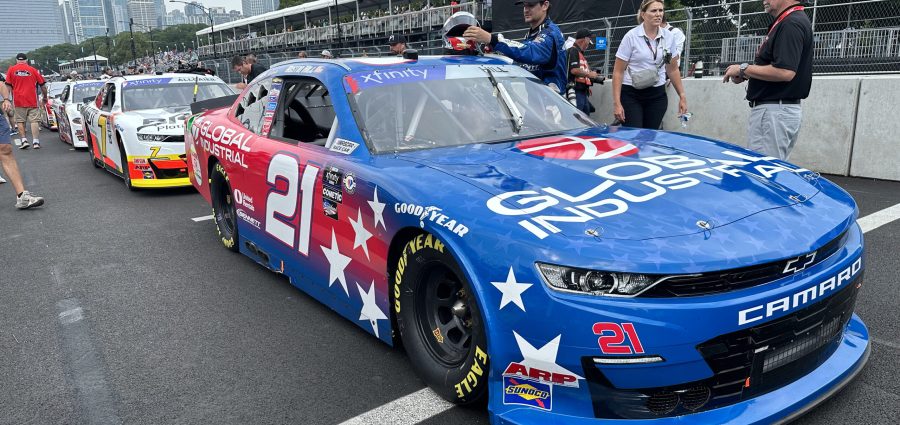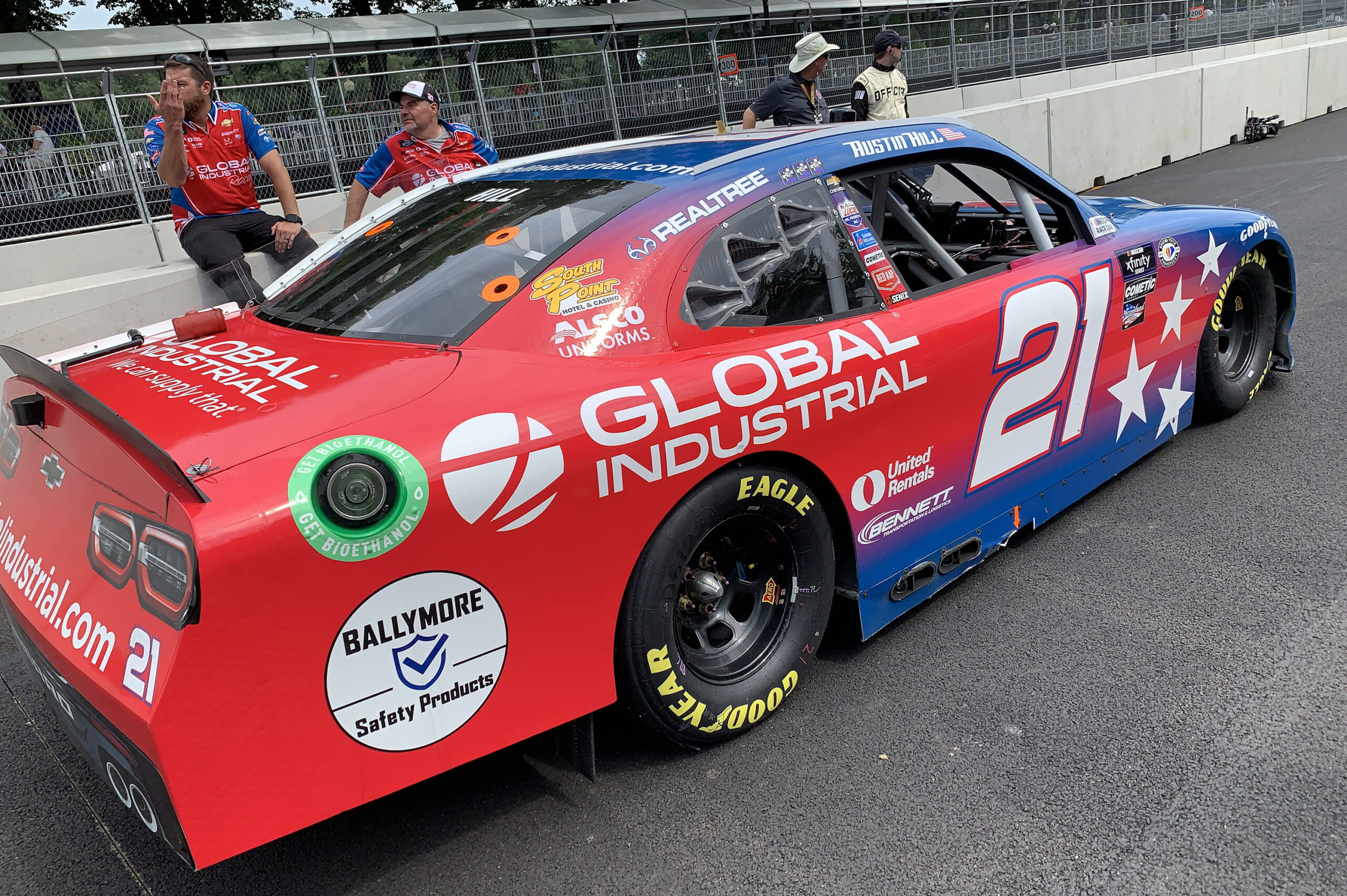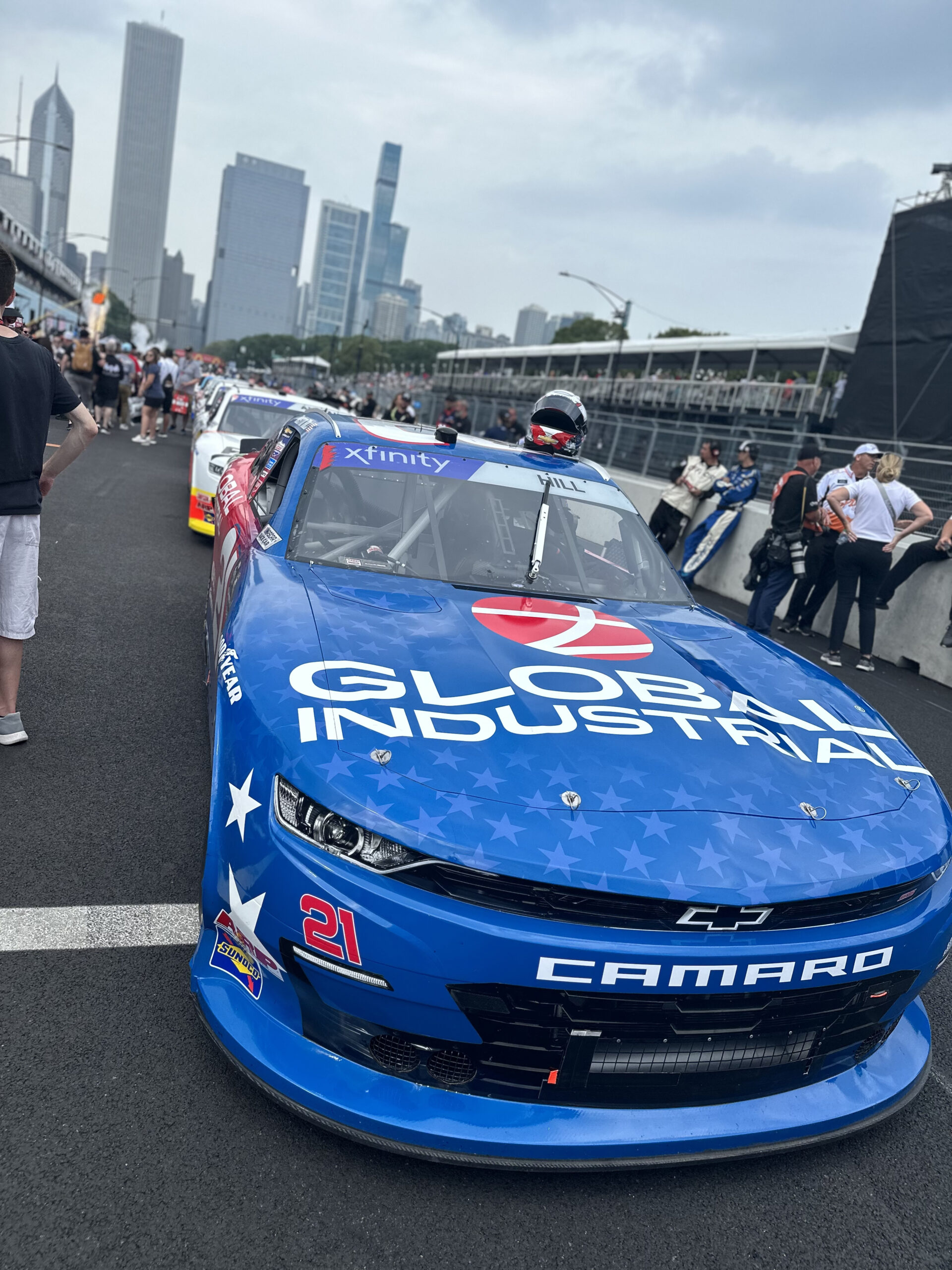Editor’s Note: Click on any image for a hi-res version. All images are by MDM Executive Editor Mike Hockett.
Until recently, when I thought of NASCAR, industrial distribution never crossed my mind.
That was before July 1, when I had the opportunity to experience racing from a distributor’s perspective. Now, I’ll always think of the two as intertwined.
On that day, NASCAR held its first-ever street race on a course traversing downtown Chicago — a major logistical and city-planning feat by any measure. As a sponsor of Richard Childress Racing’s (RCR) XFINITY Series No. 21 car, Global Industrial Company invited me down from my home office in Madison, Wisconsin to join the festivities as a VIP guest, which gave me behind-the-scenes access to what it takes for the race teams involved to give themselves the best possible competitive chance that they can.
I and a handful of Global staff members were able to get a tour of RCR’s No. 21 car hauler, meet driver Austin Dillion, walk wander pit road in the hour leading up to the race and then watch it from Global’s pit box above the street track.
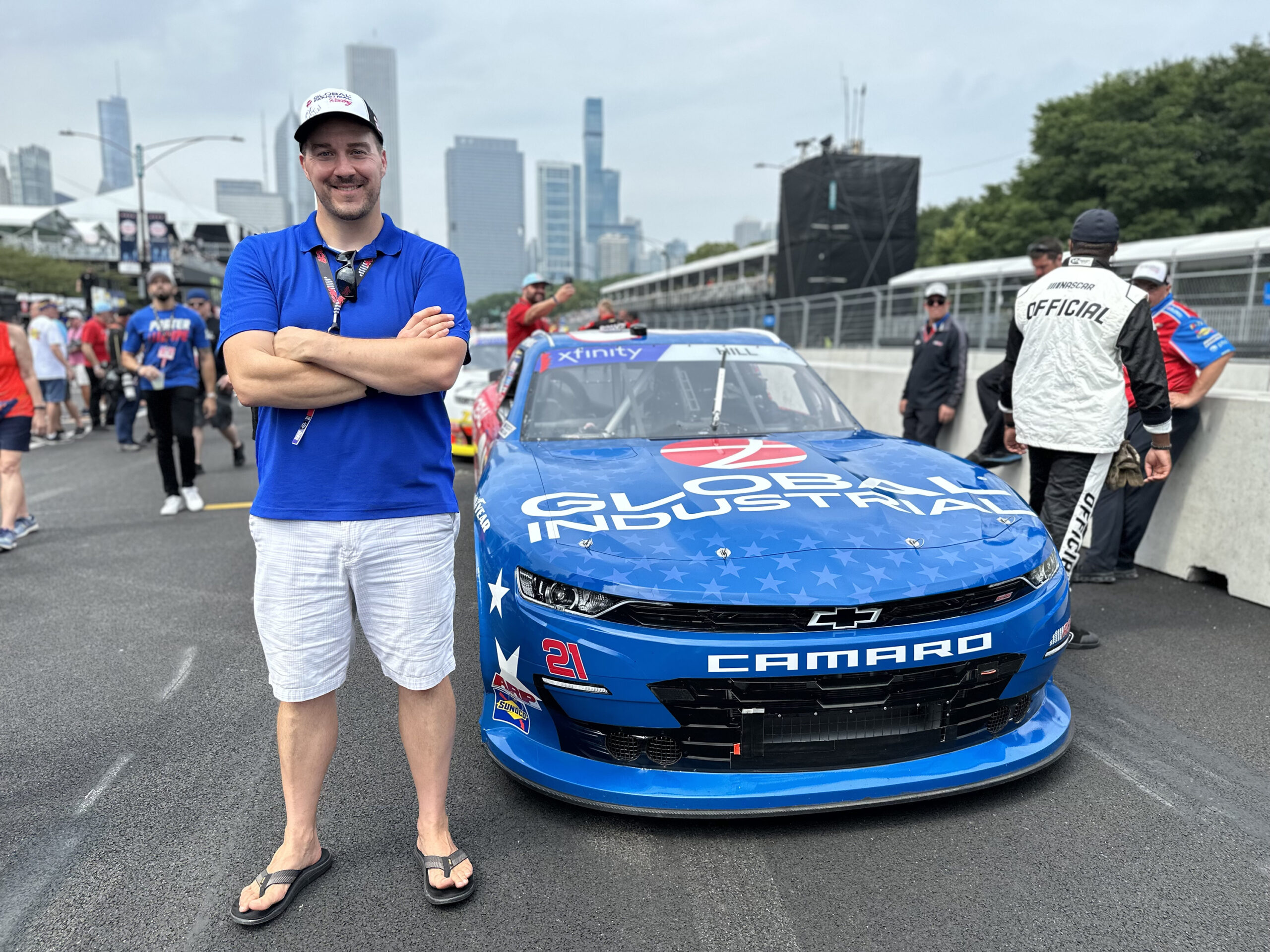
Sadly, Mother Nature put a damper on the event from a fan perspective as lighting and rain resulted in only 25 of the race’s scheduled 55 laps being completed, but it was more than enough to get a great up-close experience with the sport and a major industrial distributor. I’ve never claimed to be a NASCAR fan, as watching it on TV is just not my jam, but being immersed in it the way I was that day is a whole other thing.
In this Premium piece, I’ll walk through the details of Global Industrial’s NASCAR sponsorship and why that pairing is such a natural fit, and present a Q&A with the company’s top executive about how Global Industrial has “activated” and “engaged” that sports marketing effort and what the distributor is getting out of it.
MDM’S SHIFT Conference, held Sept. 18-20 in Denver, brings together distribution leaders to learn and network across topics of sales & marketing, digital transformation, data analytics and talent management. Find more info here.
Global Industrial + Richard Childress Racing: A Winning Pair
Global Industrial’s NASCAR association began in November of 2021 when it sponsored driver Sheldon Creed for an XFINITY Series race. Since then, Global Industrial has expanded its partnership with RCR and is now a recurring sponsor of its No. 21 car driven by 29-year-old Austin Hill, with the main sponsorship rights for several races throughout the season that spans mid-February to early November.
That pairing has worked out beautifully for Global Industrial, as the second-year XFINITY driver won two races in 2022 and garnered that season’s NASCAR XFINITY Series Rookie of the Year honor. Hill has added four victories so far in 2023, including three wins in the season’s first five races. He entered mid-August in first place in the XFINITY standings.
Global Industrial also launched its globalindustrial.com/racing webpage in late 2021, where it houses a wealth of content about the No. 21 team and how Global’s product offering supports it.
Last month, Global Industrial honored its employees by featuring the names of 1,500 of its associates on the hood of the No. 21 car that raced its way into the winner’s circle at the Poconos Raceway on July 22. Global hosted many of its employees at the raceway that afternoon to demonstrate its appreciation, which included the official unveiling of the car hood and a meet-and-greet with Hill.
Global Industrial certainly isn’t alone as a NASCAR-involved sponsor. Fastenal is the primary sponsor of RFK Racing’s No. 17 car in the Sprint Cup Series, while Würth USA has been a sponsor of the Sprint Cup’s Team Penske since 2012. Rockford, Illinois-based Porter Pipe & Supply was also the primary sponsor of Joe Gibbs Racing’s No. 19 XFINITY Series car at the Chicago race.
So, why does Global Industrial — or any distributor for that matter — sponsor a NASCAR car in the first place?
My experience with the Global Industrial team in Chicago made it very apparent just how much of a natural fit that industrial distribution is with NASCAR, which involves teams hauling essentially an entire garage full of automotive, industrial and facility maintenance supplies across the country throughout the season. Many of the products the Global Industrial racing team uses daily throughout the season and on race day — including in pneumatics, storage & shelving, material handling, workbenches, cleaning & sanitizing and more — are the same products the company provides its core customers across North America.
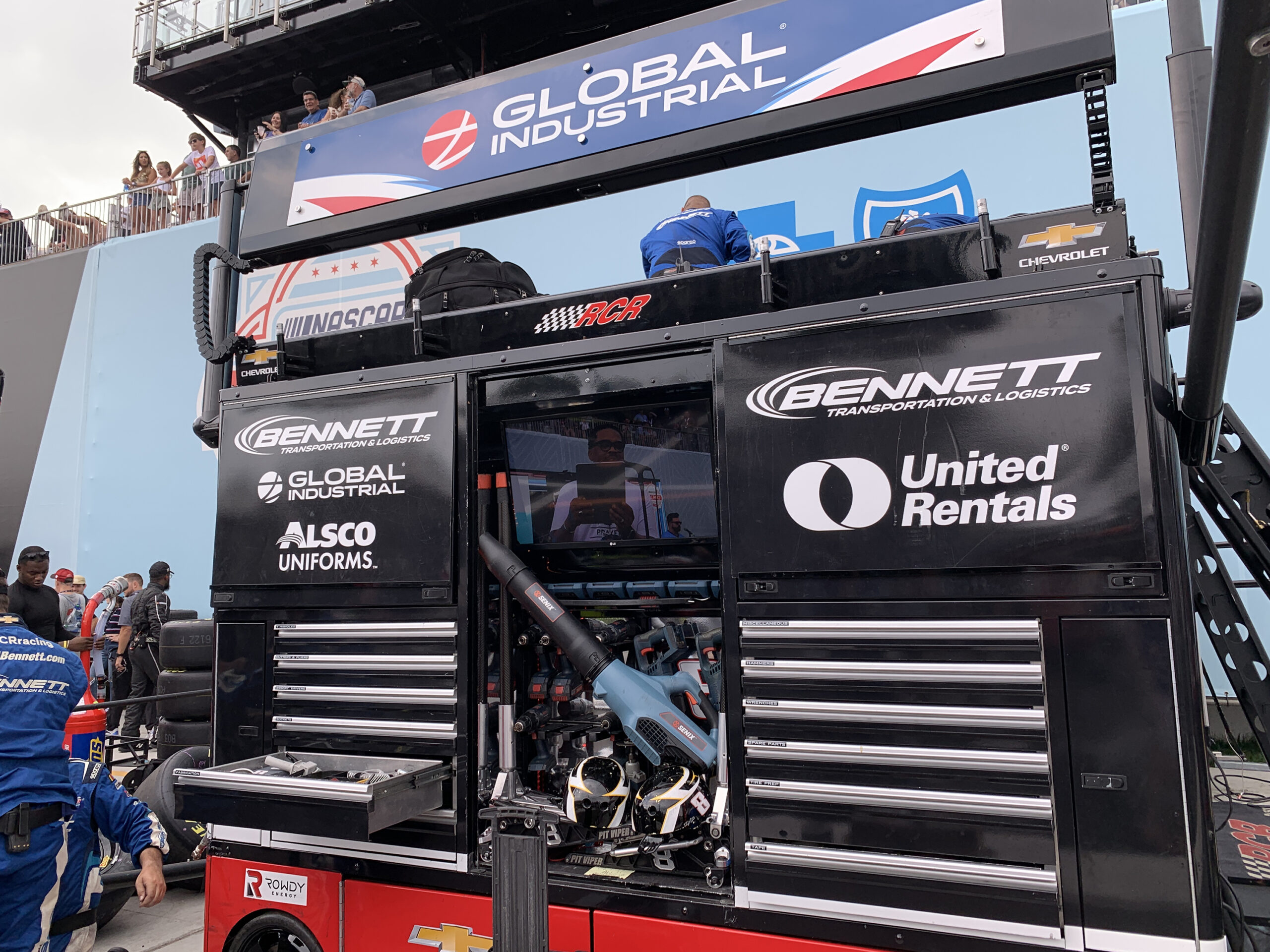
Barry Litwin Q&A
A couple of weeks after the race, I interviewed Barry Litwin, Global Industrial’s Chief Executive Officer since 2019, on this subject. He emphasized how the benefits of that sponsorship go far beyond brand exposure, and that Hill’s star performance has just been the icing on the cake when it comes to the partnership.
Litwin is one of MDM’s key speakers at our upcoming SHIFT | The Future of Distribution Conference, to be held Sept. 18-20 in Denver. In a fireside chat with Tom Gale, Litwin will discuss the recent initiatives and technology that his company has implemented to empower its direction and digital transformation in recent years.
See our conversation below.
Mike Hockett, MDM: Of all the sponsorship options for GIC to pursue, what led it to pick NASCAR?
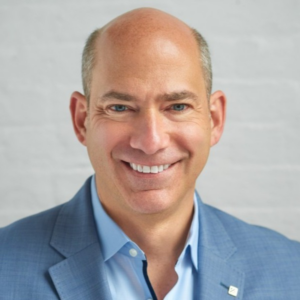
CEO of Global Industrial Company
Barry Litwin, Global Industrial CEO: One, it was really an opportunity for us to bring the Global Industrial brand to a national audience. We had just finished reintroducing our brand to the market, we changed our logos, we changed our colors, we changed our name from Systemax, and we were already really strong relative to digital marketing in what I would call bottom-of-the-funnel approach. We were looking for something that could help drive a bigger brand, presence and maybe drive more prospects through top-of-funnel activities. I had experience with sports marketing in my past life, and we had decided on trying to identify a sport that could give us a national appeal that was really aligned with what our customers liked and what they enjoyed in their free time. We found that operational buyers and folks in the warehouse and distribution logistics environment tended to like NASCAR. So we asked ourselves, ‘how can we get involved in that?’
MH: How did that conversation with RCR get started?
Litwin: We started exploring options, talking to people who had run programs with NASCAR. We started getting introduced to some of the racing teams and came upon Richard Childress, who had worked with many brands like us who were looking for the same type of thing. They talked about how they have helped create exposure for other companies’ brands, and it made sense for us to try to pilot a program with them. In our first year, we dipped our toe into the water and then started moving ahead with annual sponsorships across 36 different races for the last two years.
MH: I have to assume that Global Industrial is thrilled with how Austin has performed while prominently carrying the Global Industrial logo?
Litwin: We got lucky with Austin. We didn’t really have a preference. We let (RCR) make that decision, and we were going to back whoever we got. Austin came up from racing trucks into the XFINITY segment of NASCAR, and it turned out he was fantastic right from the start, both as a driver and ambassador for our brand. He’s had an unbelievable two-year run. That was kind of a nice surprise for us that he’s performed so well.
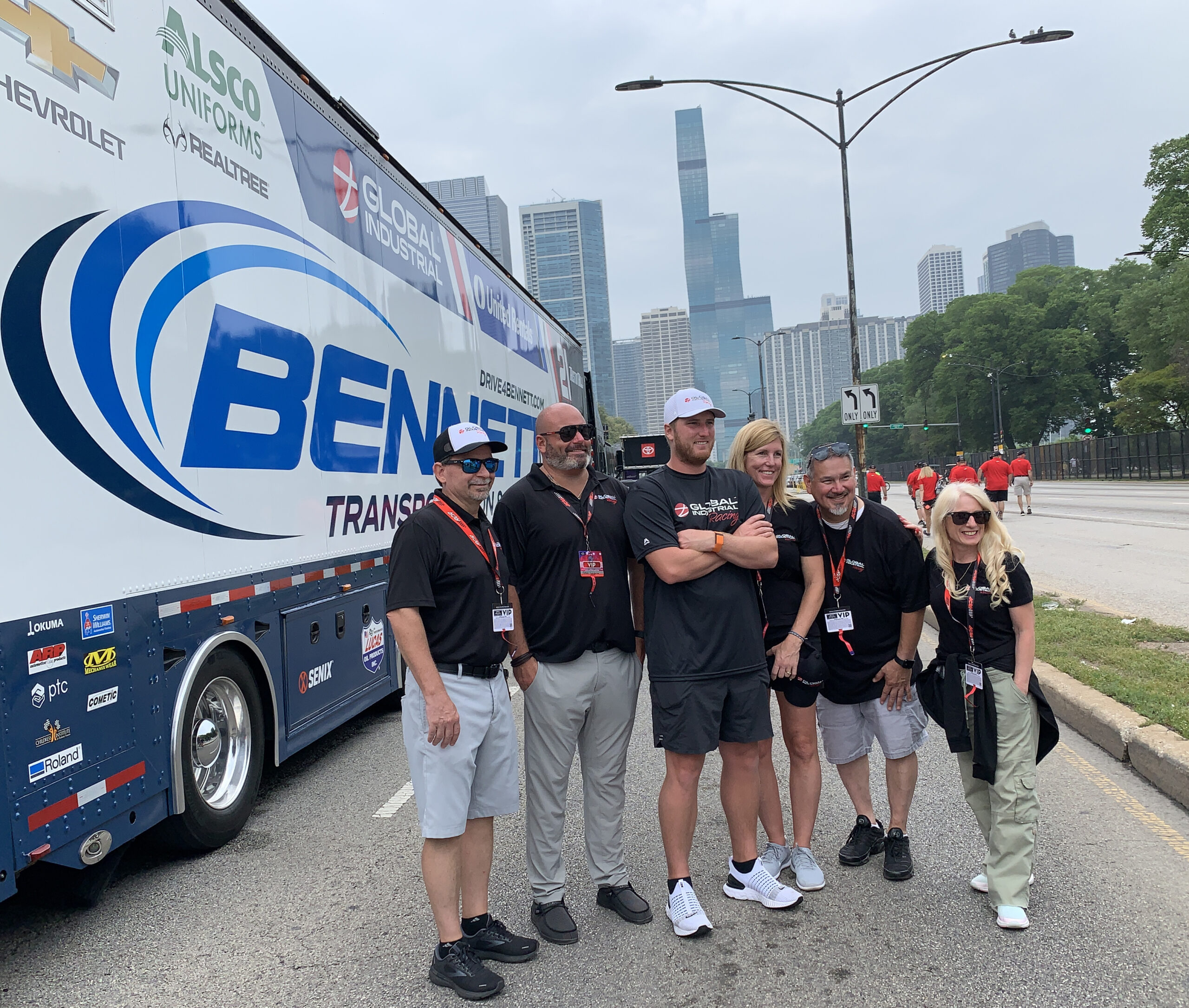
MH: It’s one thing to use sports marketing just for brand exposure and having a company logo seen by sports fans, but it seems Global Industrial has really leaned into this partnership to gain maximum benefit. How has the company leveraged this sponsorship since 2021?
Litwin: We really learned how to activate the brand over time. I think that’s one of the most important things in sports marketing, is to make sure that you’re activating it, you know, across the four corners of the marketing spectrum. So that’s what we’ve been focused on for the last couple of years.
In a sports marketing partnership, it’s one thing where a company may just ‘set it and forget it.’ So their brand name is up in all the logical places, whether it’s a stadium or a racetrack, but they don’t really put, you know, the extra chip into the relationship. For us, the most important way for it to work is brand activation, which means you have to make sure that you think of the partnership is not just something that your external customers see, but your suppliers see it, which is really important, and your employees see it.
Between the customers that you’re marketing to and your suppliers’ involvement — which is a huge component of the whole brand experience — it helps to bring really good, close relationships. At the same time, there’s the employee base, and we do a tremendous amount with our employees in terms of localized events where we bring Austin and the team in to our warehouses and our sales offices. It creates huge energy at a local level. We think that’s all part of the overall ROI equation.
And certainly, our customers are national. When we run a race down in Texas, it’s very easy for us to advertise that to our customers, and they get interested and they want to go. So it works across your customer base, your associate base and your supplier base. It’s really important to make sure that your strategy supports all three segments.
MH: What do you think Global Industrial’s NASCAR sponsorship says about the company’s product offering outside of its traditional end markets?
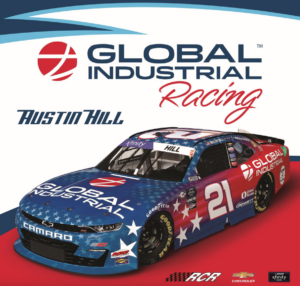 Litwin: We’re able to create VIP race experiences for both our suppliers and customers who come to these races, and they get to see where our products play, which creates a big connection with the commitment to our NASCAR sponsorship and to our own private brand products. They’re seeing how our products fit within the garage setting, in a warehouse setting and within the (car) haulers. They see the tools the team is using. All of those things are things that they can buy at Global Industrial. So there’s a huge connection to the pride that the race team has in getting their car ready and the pride we have in building private brand products under the Global brand for our customers.
Litwin: We’re able to create VIP race experiences for both our suppliers and customers who come to these races, and they get to see where our products play, which creates a big connection with the commitment to our NASCAR sponsorship and to our own private brand products. They’re seeing how our products fit within the garage setting, in a warehouse setting and within the (car) haulers. They see the tools the team is using. All of those things are things that they can buy at Global Industrial. So there’s a huge connection to the pride that the race team has in getting their car ready and the pride we have in building private brand products under the Global brand for our customers.
All of the people that we see at a race and are seeing our products are potential customers, and particularly in the SMB space or large enterprise space. I think when they see the connection between how the cars are run, the equipment, the carts they have, shelving units that they have in the back, it all starts to make sense.
MH: You touched on the employee engagement that has resulted from this sponsorship, which is great to hear about. Can you expand on that internal ROI that Global Industrial is seeing?
Litwin: When you see associates running to the races and talking about how much excitement they had and fun it was; when you see the (No. 21 car) team come to our warehouse and distribution facilities and talk to our associates during lunch and you see the excitement on their face — it absolutely translates to productivity. It really shows in the overall productivity. We see it in terms of engagement scores across the business. People are really excited to be part of a business that has that kind of association.
We have suppliers that also want to get in on the action. They want their logo on the side of the car. They want to be able to participate in different ways. We see them show up at the races, and it creates a better connection. We foster a lot of conversations at the race events that we may not have during the course of the business day because you’re in a much more relaxed setting. I think it really helps the exchange of business ideas and possibilities there.
So it’s kind of a three-dimensional return on investment. If you just look at it from media value and direct sales to the company, it’s a little harder to measure that, but it’s one of those things where we just feel we’ve got to be there because it feels right for the company to do this.
MH: What does this sponsorship say about RCR’s faith in Global Industrial to be a great representative for their brand?
Litwin: Like I said earlier, I’ve seen companies who invested in sports marketing but didn’t really activate it. They let their brand ride and they didn’t really engage the event or the program with their audience. And I think they miss a lot. It ends up becoming more of a true ROI on what type of business it is bringing in, as opposed to really activating and seeing the impact it has on your supplier relationships, employee engagement and happiness with the business. I think the race car companies themselves like Richard Childress Racing would much rather work with a partner who is highly engaged in the total experience. I’ve talked to Richard Childress and their president about that. Everyone loves to work with a customer who is highly engaged, is looking for ways to do things differently to either get their brand out there, or to carry their name and their own marketing. We do a lot of marketing with Austin’s name, we do a lot of videos with him and our people. It’s fun. It’s really cool to see. When you have pictures and video of him walking through their garage and seeing our products — particularly our private brand — and seeing how many Global products actually fit within a real-life, professional setting, that connection to our brand is worth gold. And we love seeing that. People notice it and it gets them excited.
MH: Anything else you think our MDM audience would be interested to know about Global Industrial’s NASCAR sponsorship?
Litwin: I would say that everything is a test-and-learn as you go about it. We’re an MDM Top Distributor (No. 13 on MRO Industrial Distributors), but we’re certainly not the biggest in the pack. So we always have to work harder. I think the majority of distributors out there probably feel the same — they’ve got to work harder. They don’t have the scale; they don’t have the No. 1 cost efficiencies; they don’t always have the number one allocation with suppliers; and so on. So we’ve always looked at this partnership as a way for us to continue to show our commitment to our customers in the market and our suppliers. And we’re willing to do what it takes to provide the ultimate experience for our customers. And that’s what our ACE (Accelerating the Customer Experience) program is all about. Yes, it comes from fulfillment. Yes, it comes from customer service. But it also comes from what is unique and different about us and how we stand out, and that’s where we think this partnership we’ve had over the last several years with NASCAR has been really strong.
